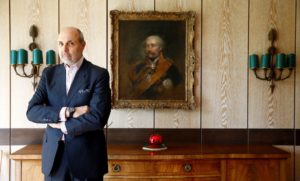
Two centuries after his Prussian ancestor rallied with the Duke of Wellington to win the Battle of Waterloo, Gebhard Leberecht von Bluecher’s direct descendant is desperate for Britain and the Germans to work together again to forge a reformed EU.
Lukas Graf Bluecher von Wahlstatt is the great, great, great, great grandson of the Prussian field marshal of the same family name, whose alliance with Wellington at Waterloo in present-day Belgium defeated Napoleon, securing peace in Europe.
Speaking to Reuters from his family home in Bavaria, Bluecher said he shares the dissatisfaction of many Britons with the EU but wants Britain to help reform the bloc rather than retreat into isolation and fond contemplation of its history.
“It’s time for a redesign, and we would just love to have the input of the Brits and not have them turn the other way,” said Bluecher, 59. British friends, he said, told him their heads told them to stay in the EU but their hearts said ‘leave’.
“For me it’s the other way around,” he said. “My head says ‘go’ – it’s become very difficult, it’s maybe as many of the Brits say, easier to leave than to renegotiate. But the heart says ‘no, for God’s sake please stay and force us to change.'”
Britain votes in a June 23 referendum on whether to remain in an EU which critics say is stifling the economy with red tape and undermining national sovereignty. Polling firm TNS said on Tuesday the campaign to get Britain out of the bloc has taken a three-point lead over the “Remain” campaign.
Germany’s political establishment favors Britain staying, with Chancellor Angela Merkel calling last month for “an economically strong and prosperous Britain in the European Union”. Some fear British departure would skew the center of balance of the Union to the south with its weaker economies.
Asked what his field marshal ancestor – to whom he bears a striking resemblance with his broad shoulders and receding gray hair – would make of Europe and the Brexit debate today, Bluecher, a start-up entrepreneur, replied:
“I think he would have said ‘let’s march forwards!'”
A portrait of “Marshal Forwards”, as he was known to his troops, hangs proudly on the paneled wall of his family home; adjacent to it, an antique clock, mounted with a bird of prey.
At Waterloo, on June 18, 1815, Wellington found himself in a dire position until the arrival of the Prussians, whose support helped win the battle that proved a turning point in the development of state systems in Europe.
Wellington and Bluecher held central command during the battle but also relied on commanders in the field to take critical decisions – a lesson from which the Prussian’s ancestor believes Europe can learn today.
EU “DESIGN FLAW”
To address what he called a design flaw in the EU’s “over-centralized” construct, Bluecher said “we need to allow for more diversity rather than trying to put everything under the Brussels hat.”
“On a continent this size, you cannot possibly attend to all the necessary details from a central point,” he added. “The USSR tried that with communism. We all know how well that worked. It went down the drain in no time.”
Instead, Europe needs to cater to what he calls the “strong cultural identities of our regions”, Bluecher said, arguing that a failure to do so had led to the rise of the far-right National Front in France and the Alternative for Germany party here.
While he said Britain often focused too much on its “glorious past”, Bluecher argued that in trying to move on from Germany’s Nazi history and Napoleon’s wars, much of continental Europe has “forgotten where it came from”.
He said comments from Boris Johnson, the leader of the campaign for Britain to leave the EU, that efforts by Napoleon to unify authority in Europe had ended tragically were “unfair if not silly” as they focused only on the negative.
“His innovations did not go under, even though he did go under,” he said of Napoleon, pointing to the Napoleonic Code, with its stress on clear and accessible law, as an achievement.
It was essential for Germany to keep Britain in the EU, such that three leading powers – Berlin, Paris and London – could bear the load of leading a Union born of determination to halt conflicts that have ravaged the continent.
“Imagine a big round table standing on two legs. Good luck. The least you need is three.”